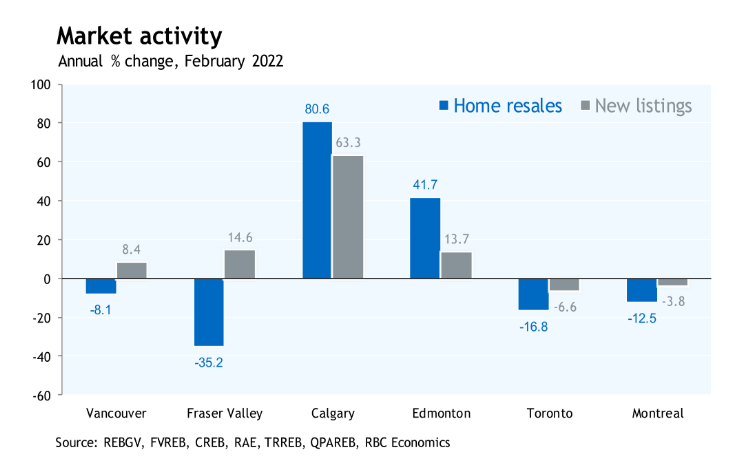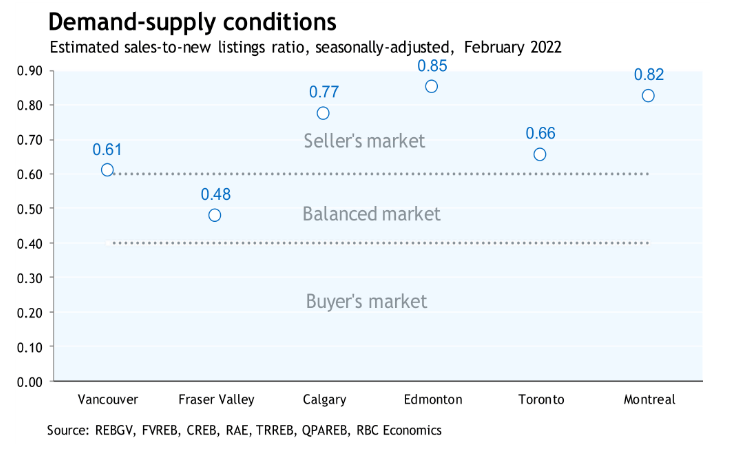We’re only two months into the year but Canada’s real estate market is seeing the inventory story change fast. An analysis from RBC shows key markets have seen inventory improve for February. The bank hesitates to call it a trend, but markets are getting close to “balanced.” As interest rates rise, home sales are expected to normalize, further improving supply.
Major Real Estate Markets See Buyers Drop Faster Than Sellers
Canada’s largest real estate markets are seeing buyers disappear faster than sellers. In Vancouver, annual growth of new listings are up 8.4% for February, while home sales fell 8.1%. Over in Toronto, new listings fell 6.6%, but home sales fell 16.8% — showing buyers dropping out twice as fast as sellers. Similar trends can be observed in Montreal and Fraser Valley. National data won’t be released for a few days, but the biggest markets have seen more inventory.
Alberta Real Estate Is A Big Exception
Alberta real estate is the big exception here, with its major markets tightening. Calgary new listings grew 63.3% in February, while sales advanced an even larger 80.6% at the same time. Edmonton new listings similarly grew 13.7% from last year, while sales climbed 41.7% higher. Alberta real estate had been left out of the rally over the past few years, but it’s been making up for time.
“One month doesn’t make a trend but if February is any indication, more sellers may be (finally) making their way into Canada’s housing market,” said RBC Economist Robert Hogue.
He further notes that inventory can reach healthier levels if interest rates rise. Since this was February, the impact of higher interest rates had yet to hit the market.
Canadian Real Estate Markets Are Moving Towards Balanced Inventory
Canada’s major real estate markets are seeing relief from inventory problems. The sales to new listings ratio (SNLR) is “balanced” and healthy for demand when it is between 40% and 60%. In February, Vancouver’s SNLR fell to 61.0% — just a point below the balanced mark. In Toronto it dropped to 66%, which was almost half the ratio reported this past December. Demand is dropping faster than inventory, and markets are getting close to healthy.
At the risk of sounding like a broken record, one month doesn’t make a trend. Though all trends start with a month. The market is still very tight, with limited inventory clearly a problem. However, things have shown a big improvement from where they were a few months before. Last month had yet to see higher interest rates, which act as a demand cooling measure.



I believe that most Canadians finally realize this crazy market is way overvalued and cannot be sustained.
People need to just chill out and not worry about buying. I know it doesn’t look like it but you will be rewarded for your patience within 6 months.
The government must put the2 year moratorium on non residents immediately. Push for that with your MP.
They must also come down hard on monet laundering. Push for that also.
There’s too much incentive for all segments of investors right now. I have clients that are being sold on the idea from their mortgage broker to use their HELOCs to buy a couple of properties for perpetual rent and then leverage up against those properties.
One mistake and they aren’t just broke, they’re broke for generations. Won’t even listen if you tried to explain, “may just buy one property first and see how it goes.”
With rising inflation and rising interest rates we have the makings of a major squeeze on consumer confidence. Inflated bubbles will deflate very quickly and could lead to crashes in some. When the tide goes out, we will see who is swimming naked.
This is what happens after panic buying. I am a Realtor based in Toronto and I have witnessed Euphoria in the beginning of 2017 and the market bust. Market is never one direction. We have a record level inflation, interest rates are rising. High probability of a recession. What surprises me is the buyers are not looking at all these indicators pointing towards a correction.
I am a Realtor